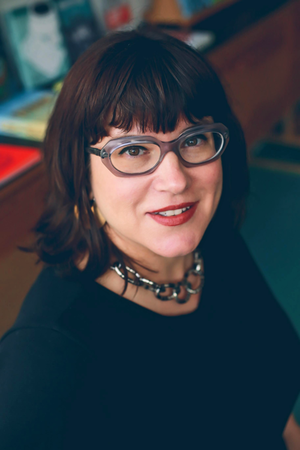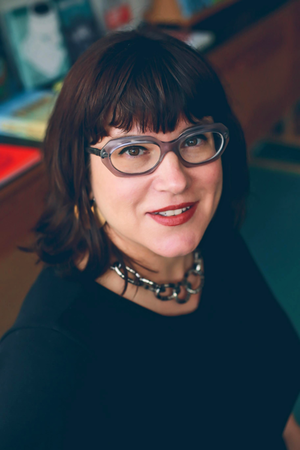We’re always glad to see the subject of a story show up in a comment thread. When the subject of a story happens to be a political candidate on her way to hundreds of thousands of ballots in a few months, that’s even better.
Thursday morning, Portland City Council candidate Chloe Eudaly jumped (politely but authoritatively) into a discussion about her positions on transportation and housing. It was taking place beneath our post about her late surge to make the November runoff against sitting council member and Transportation Commissioner Steve Novick.
Her transportation thoughts are, she admitted, weak on detail so far. But they’re strong on credibility — among other first-rate literary references, they included a story about her time biking around Amsterdam with one of the best-known writers about urban bicycling, “Dishwasher” Pete Jordan.
Here’s what Eudaly wrote, partly in response to Terry Dublinski-Milton’s observation that she hadn’t returned a Bike Walk Vote questionnaire:
Hey Everybody, I am very sorry I didn’t get the questionnaire back before the primary. This has been a hectic four months for me — working, parenting and campaigning — and I’m afraid because there was no deadline attached it kept getting buried by more time sensitive stuff. I will submit the questionnaire soon, in the meantime I can tell you a bit about my relationship to bikes, cars, and public transportation…
I lived car free for many years in my 20s and prioritized living within biking/walking distance to work. However, two things have changed in my life since I hit 30 — I had a kid who happens to have a severe physical disability and uses a wheelchair (he’s now 15) and we’ve been pushed out of the central city by rising rents in the past decade. To complicate matters, parents of kids with disabilities don’t always get to choose where their children attend school, so while we have always lived within walking distance of our neighborhood schools (currently Woodlawn/Jefferson) he was never able to attend them. There is no safe way for me to transport my son by bicycle, nor is there enough time in the day for us to exclusively use public transportation (I work full time and am a single parent), especially considering we sometimes have to wait for 2-3 buses just to board if the wheelchair spot is occupied. If you have kids, please imagine a situation where no one else has a vehicle that could accommodate your kid, you can’t ask a friend or neighbor to grab them in a pinch, and they cannot get themselves to or from home — this is my situation. So, I own a wheelchair van and a bicycle. I drive about half as much as the average person, and I rent more fuel efficient cars for my very occasional road trips, but I am dependent on the van until or unless I can create a life for us where home/work/school/medical services are close-in and reliabely accessible by public transportation (which probably means living near a Max or streetcar line).
I do enjoy riding my bike (a Linus Dutchi I bought from my friend Kim at North Portland Bicycle Works — one of the few off the shelf bikes I can ride as I’m just a little over 5′ tall), although I feel somewhat ruined for cycling in Portland after spending a few days tooling around Amsterdam on bikes with my friend Pete Jordan, who’s the author of In the City of Bikes: The Story of the Amsterdam Cyclist. Pete, a former Portlander and avid cyclist, planned to spend a school year studying urban planning in Amsterdam in 2002 and he never left! I’m looking forward to talking to him about his take on how Portland is measuring up on bicycle transportation.
Advertisement
I got interested in urban planning, humane architecture, and transportation issues as a teenager when I stumbled upon books by Bernard Rudofsky (Streets for People) and Christopher Alexander (A Pattern Language). I’m probably not going to have every answer you want right now because I’m someone who really needs to dig into issues and get a broad grasp before I start asserting opinions and suggesting policy solutions, but this is what I can say for certainty right now: Safe and accessible streets for pedestrians and cyclists are a priority for me and we need to be creating them across the city. I’m interested in what Bike Portland has to say about equity across our neighborhoods in regards to things like sidewalks, crosswalks, and bicycle infrastructure. When people cannot safely walk in their neighborhoods and many people with mobility challenges (growing in numbers with our aging population) are virtually housebound due to living in inaccessible neighborhoods, it’s hard to get them excited about spending $$$ on bike paths. I’d personally love to see continued and increased collaboration between bicycle advocates, disability advocates, and neighborhoods around these issues.
I’m also interested in incentivizing living close to home (some cities have special home loan programs for people who commit to this), improving our public transportation system including making it more affordable for low income riders like Seattle is doing, preserving and increasing housing in the central city for low income and moderate income earners in order to reduce commuting among other things, and creating more events along the lines of Sunday Parkways where we at least temporarily take back our streets for other purposes. Since most of our cities were designed around the automobile, it’s hard for a lot of people to conceive of why we’d want it any other way, we need to start showing them. xc
It’s worth noting that Novick would have had a harder time biking around Amsterdam with Jordan, because of his own physical disabilities. He tried to ride a bike while growing up outside Eugene but (as he put it once) “kept falling off” and hasn’t biked himself since. That hasn’t stopped him from gradually being a solidly pro-biking commissioner over the last four years, notably by choosing to take huge heat over the walking and biking improvements he fought to keep in the gas tax package.
We hope Eudaly will fill in her own policy perspectives on the ways biking can help create a less car-dependent city for everyone — and that the next five months will include some healthy debate between them over how to make biking improve the lives of more Portlanders, whether or not they personally can ride a bicycle.
Eudaly’s personal history sound like a potentially great foundation.
— Michael Andersen, (503) 333-7824 – michael@bikeportland.org
Our work is supported by subscribers. Please become one today.



